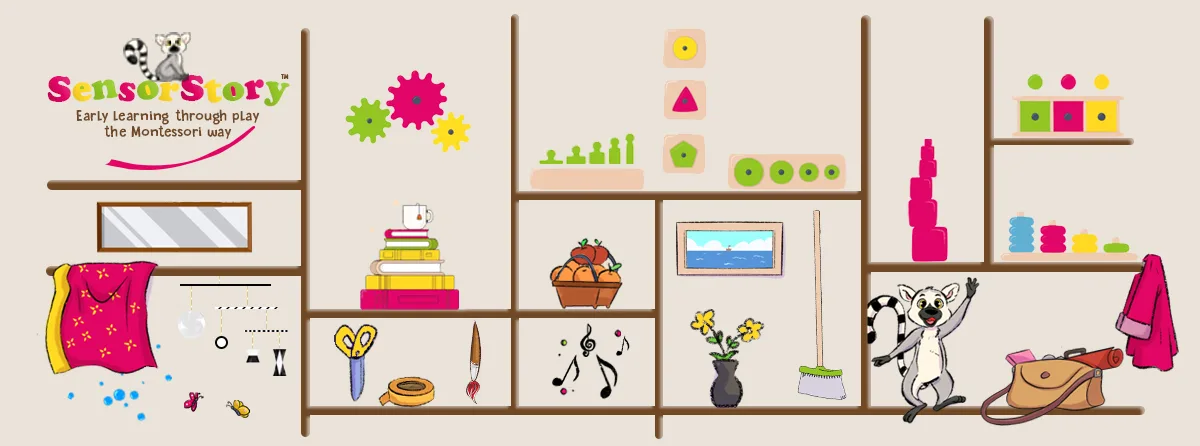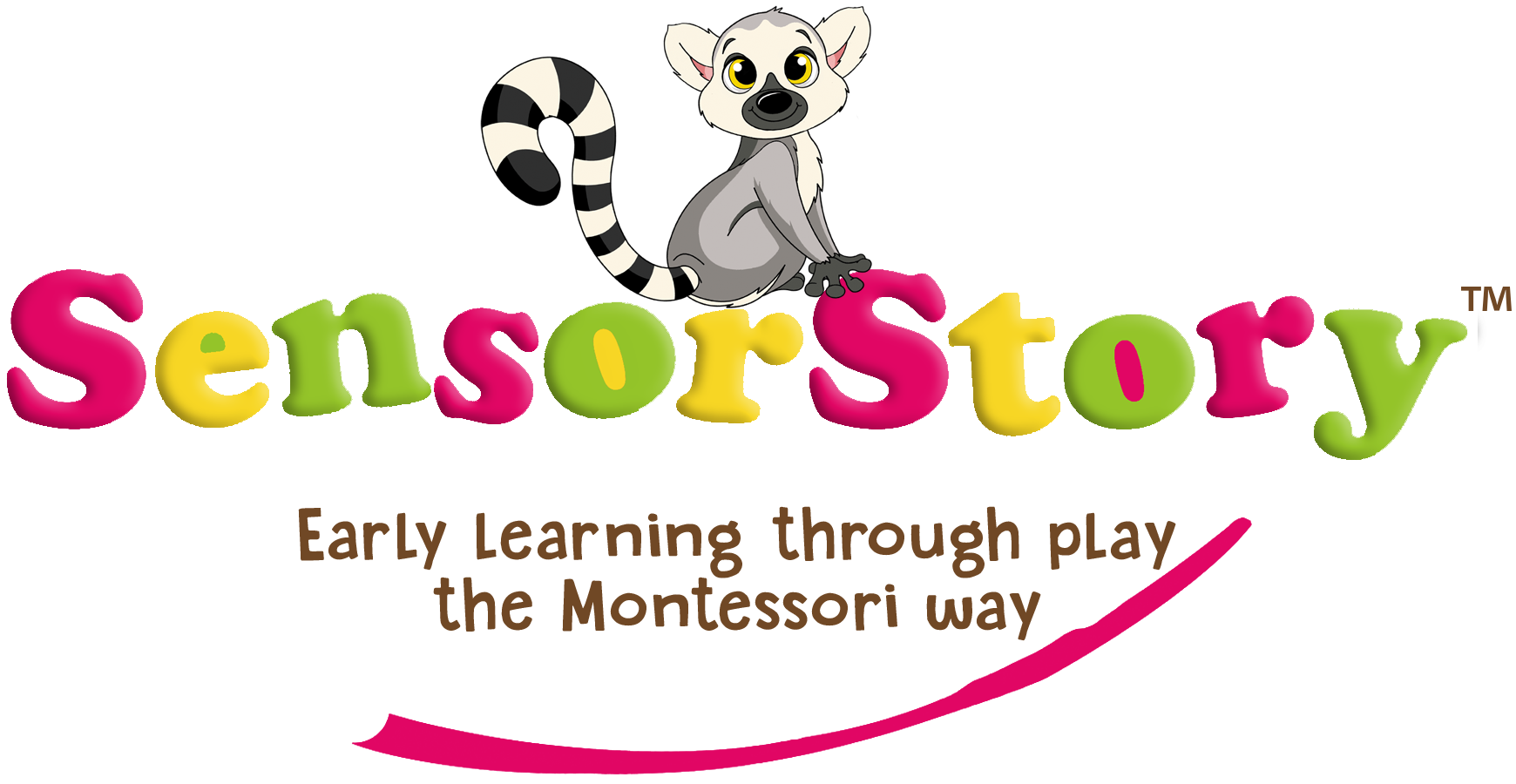We've put together a detailed list of at-home Montessori-aligned activities suitable for a 13-month-old.
Here you will see age-appropriate activities for all areas, in our Ultimate Series Of Activities to try at home, where the emphasis is on providing a prepared environment and allowing the child to actively engage in self-directed learning.
So what is my child working on mastering at this age?
Between the 12-14 month age, typically we will see them focused on mastering motor skills like walking, refining language development, fostering independence in self-care activities, developing social skills, exploring the environment independently, and experiencing ordered and organised spaces to enhance their sense of security.

1. Practical Life Skills:
* Introduce simple self-care routines, such as letting your baby wash hands or brush teeth.
* Provide a small, child-sized broom or mop for them to participate in cleaning activities.
* Encourage baby to drink from a child-sized cup independently.
* Offer your baby a small glass of water and a small pitcher to let them pour and drink by themselves.
* Chopping foods: Offer baby a child-safe knife such as a wooden chopper, and some soft foods, such as banana, or tofu to chop.
2. Fine Motor Skills:
* Transfer Activities: Offer opportunities for the child to transfer objects between containers using small tongs or scoops.
* Open and close basket: fill a basket with different containers and bags that your baby can practice opening and closing, such as jars, tins, pouches, or boxes.
* Stacking: Provide stacking cups or blocks for the child to build and knock down.
* Pincer Grasp: Introduce activities that involve picking up small objects with fingers, like placing objects into a container.
* Introduce baby to simple puzzles, such as knob puzzles, shape sorters, or peg puzzles.
* Size discrimination peg block: Give baby a peg block toy with different sized holes and pegs to let them match and fit them together.
* Posting straws: Cut some paper straws into different lengths and give your baby a recycled container with a hole in the lid to let them post the straws into.
* Provide baby with child-safe scissors and show them how to hold and cut along the lines of paper strips.
* Peeling a boiled egg: Offer baby a boiled egg and help them start peeling it by crushing some of the shell and peeling it a little, then let them finish peeling and eating by themselves.
* Wet pouring: offer baby a small pitcher and a cup and show them how to pour water from the pitcher into the cup.
* Threading: have large wooden beads and a string and show them how to place the beads onto the string.
3. Movement:
* Obstacle Course: Create a safe indoor or outdoor obstacle course using soft cushions or low climbing structures.
* Blowing bubbles: Encourage baby to chase and pop bubbles, or blow them themselves, to improve their movement and breath control.
* Balance Play: Encourage walking on different surfaces, such as grass or textured mats or offer a Montessori balance board.
* Ball Play: Engage in activities that involve rolling or tossing a soft ball back and forth.
* Create an obstacle course using pillows, cushions, tunnels, and other safe objects from around the house to encourage crawling and movement.
* Offer a ball pit and encourage your baby to play with balls to help develop hand-eye coordination and gross motor skills.
* Provide your baby with a steady and sturdy walker wagon to support them as they take their first steps.
4. Sensory Exploration:
* Water play: supervise water play with a shallow basin, encouraging baby to splash and explore.
* Outdoor nature exploration: encourage baby to touch and explore natural elements like grass, leaves, or flowers.
* Create a sensory bin with safe materials like rice, beans, or soft fabric for tactile exploration.
* Encourage baby to explore different scents by providing them with a variety of smelling materials like flowers, herbs, or spices. You can also create a scent basket filled with different smelling objects like lavender sachets, cinnamon sticks, or citrus peels.
* Explore sensory play with home-made playdough.
5. Language Development:
* Reading time: Read books with simple narratives and engaging illustrations.
* Vocabulary building: encourage your baby to point to and name objects in their surroundings.
* Conversation: engage in meaningful conversations, responding to your baby's attempts at communication.
* Engage in Baby Sign Language with your baby. Teach your baby simple signs like “more,” “all done,” and “milk” to help them communicate before they can speak. To learn more about using Baby Sign Langauge click here.
6. Sorting and Categorising:
* Colour sorting: provide objects for baby to sort by colour such as balls, and some jars or boxes for baby to sort them into.
* Shape sorting: introduce simple shape-sorting toys for exploration.
* Everyday sorting: engage baby in sorting everyday items like fruits or household objects.
7. Outdoor Exploration:
* Arrange outdoor play sessions to explore natural elements like grass, sand, or leaves.
* Introduce simple gardening activities with safe, child-friendly plants.
* Bug hunt: Go on a bug hunt with your baby and let them observe different insects like ants, beetles, and butterflies. You can also provide them with a magnifying glass to get a closer look.
8. Art Exploration:
* Drawing and scribbling: offer large crayons or markers for baby to draw and scribble.
* Painting: use washable paints for simple painting activities.
* Texture art: provide various textures like fabric or sponges for tactile art exploration.
* Use everyday objects like corks to create stamps. Dip them in paint and encourage your baby stamp them on paper to create patterns.
9. Independence in Daily Activities:
* Drinking skills: encourage independent drinking from a toddler-sized cup.
* Clean-Up routine: Involve baby in simple clean-up activities after play.
* Assist in simple tasks: allow your baby to assist in simple household tasks, such as putting away laundry.
10. Social Interaction:
* Playdates: arrange playdates or group activities to promote social interaction.
* Turn-taking games: engage in simple games that involve taking turns such as passing a soft ball back and forth. Learn more about why Montessori advocates Turn-Taking Over Sharing here.
* Model social behaviour: Demonstrate and encourage turn-taking and cooperation during play.
11. The Whole Child Development:
* Attend our weekly SensorStory Baby and Toddler Montessori parent-child sensory classes! Follow this link to enrol your infant here.
We hope we have given you some inpiration for activities to do with your 13-month-old!
Remember, follow the child, adapting activities based on your observation of your baby's developmental stage and individual interests. The key in a Montessori environment is to provide your child with real, purposeful, and age-appropriate tools and materials that allow them to engage in activities independently and at their own pace.
Disclaimer: Adult supervision is required for any activity suggested by SensorStory. Please follow any directions and/or warnings on the labels(s) of any materials used during such activity & be aware of any potential choking hazards or allergies.
Click here to see our
Activities To Do With A 15 Month Old FAQ.
